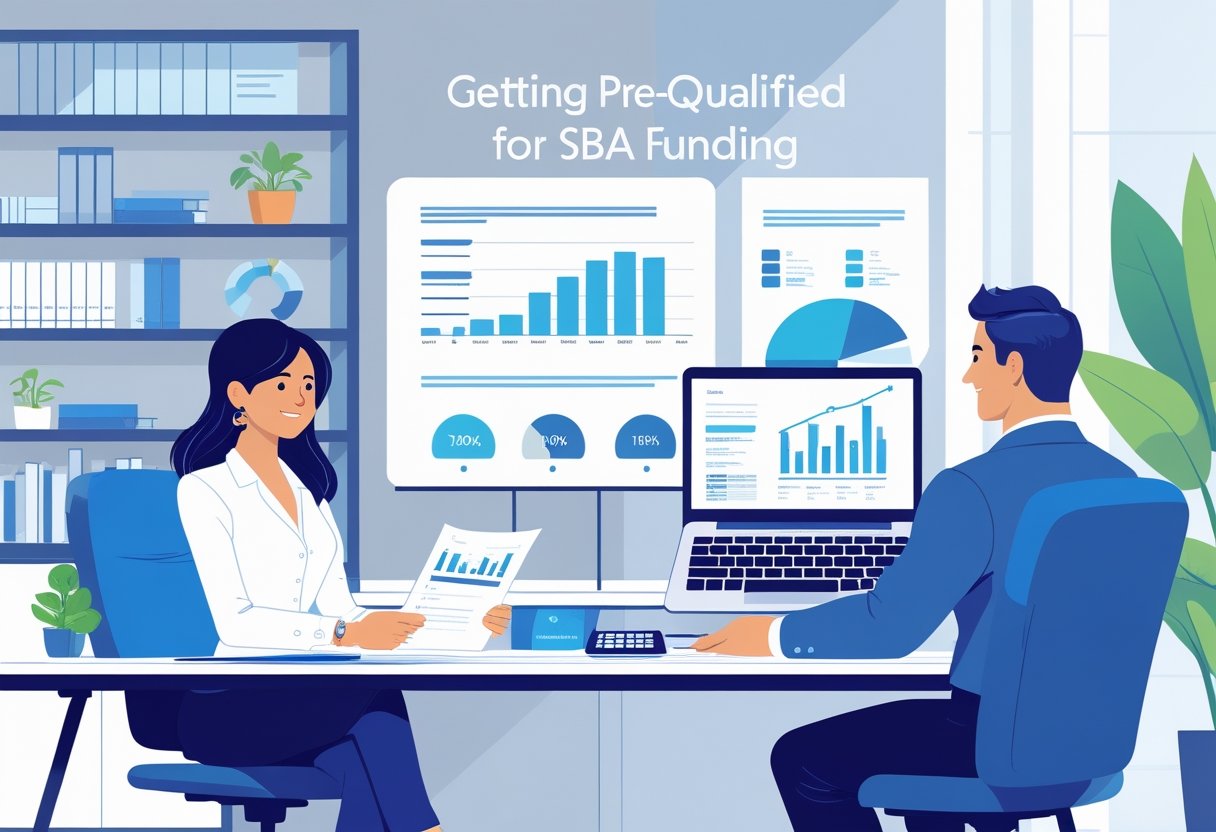
SBA Preferred Lender Program: Faster Access to Capital
The SBA Preferred Lender Program is designed to streamline the loan approval process for small businesses seeking access to capital. By working with an SBA Preferred Lender, you can benefit from faster decision-making and a smoother application experience, enabling you to focus on growing your business. These lenders are authorized to make lending decisions without waiting for approval from the Small Business Administration, making them a valuable resource for entrepreneurs.
At SBA Central, we understand how crucial it is for small businesses to navigate the complexities of securing funding. As the #1 SBA Resource Library on the Internet, we provide a comprehensive array of tools and information to help you succeed. From applying for SBA loans to accessing expert consulting services, our resources are tailored to meet your unique needs.
Taking advantage of the SBA Preferred Lender Program can give you a significant edge in funding your business initiatives. With our expertise and extensive support network, you can confidently move forward in securing the financing necessary for your company's growth and success.
Understanding the SBA Preferred Lender Program
The SBA Preferred Lender Program allows select lenders to expedite the loan application process for small businesses. This designation is based on specific criteria that evaluate a lender's expertise and track record in handling SBA loans.
Criteria for Preferred Lender Status
To achieve Preferred Lender status, a financial institution must meet rigorous standards set by the SBA. These criteria include a demonstrated history of successful SBA loan approvals and a high volume of lending activity.
Additionally, lenders must show expertise in navigating SBA guidelines and exhibit strong financial stability. The SBA evaluates the lender’s underwriting practices and performance metrics, ensuring they can effectively service small business loans. This status enables lenders to streamline procedural requirements, benefiting borrowers with faster decisions and fund disbursements.
Benefits for Small Businesses
Working with an SBA Preferred Lender provides numerous advantages for small businesses. These lenders can expedite the loan approval process, often reducing wait times significantly compared to traditional lending avenues.
Moreover, Preferred Lenders have specialized knowledge of SBA programs, allowing them to offer tailored financial solutions that align with your specific needs. Their experience means they understand the unique challenges small businesses face and can guide you through the eligibility requirements effectively.
Additionally, many Preferred Lenders offer lower fees and more favorable terms and conditions, making SBA loans even more accessible and affordable for small business owners.
Program Structure and Oversight
The SBA Preferred Lender Program operates under a structured framework that includes robust oversight mechanisms. The program is designed to maintain high standards while also providing flexibility to lenders.
Each Preferred Lender is required to comply with SBA regulations and undergo regular evaluations. This ensures adherence to policy guidelines and performance standards.
The SBA offers support through trainings and resources, which helps lenders improve their service offerings. As the #1 SBA Resource Library On The Internet, SBA Central stands out by providing tools and information essential for navigating this program. With a breadth of services, including staffing solutions and consulting expertise, you can trust SBA Central to help with all your SBA-related needs.
SBA Loan Products Offered by Preferred Lenders
Preferred lenders offer a variety of SBA loan products designed to meet the unique needs of small businesses. Understanding these options can help you determine the best fit for your financing requirements.
SBA 7(a) Loans
The SBA 7(a) loan is the most common SBA loan product available. These loans can reach up to $5 million, with repayment terms up to 25 years for real estate purchases. They are typically used for purposes such as working capital, equipment purchases, and business expansion.
These loans are often attractive due to their low down payment requirements, starting as low as 10%. Preferred lenders can expedite the application process, enabling faster access to funds. Interest rates are competitively priced, often ranging from 6% to 9%, depending on the loan amount and repayment term.
SBA 504 Loans
SBA 504 loans provide long-term, fixed-rate financing for major fixed assets, such as real estate and heavy machinery. The maximum loan amount is $5 million, with terms typically lasting 10 to 25 years. These loans are designed to stimulate business growth while preserving job opportunities.
The 504 loan structure involves two loans: one from a preferred lender and another from a Certified Development Company (CDC). This collaboration allows for a lower down payment, often around 10%. The attractive fixed interest rates can significantly reduce monthly payments, making this option ideal for businesses looking to invest in substantial assets.
SBA Microloans
SBA microloans cater specifically to startups and small businesses needing smaller amounts of capital. The maximum loan amount is $50,000, making them suitable for entrepreneurs requiring a modest financial boost.
These loans are often used for purchasing inventory, equipment, or working capital. While the repayment terms generally span up to 6 years, the interest rates are competitive, usually ranging from 8% to 13%. Microloans are often processed through community-based organizations, providing uniquely tailored support and resources.
Express and Export Loan Programs
The SBA Express Loan program offers rapid access to funds, with a maximum loan limit of $500,000. The process can be completed in as little as 36 hours, making it ideal for businesses needing immediate financing. Interest rates are typically determined by the lender but generally range from 6.5% to 9.5%.
The SBA Export Loan Program assists businesses in expanding their products or services internationally. This program offers access to both 7(a) and Express loans tailored for exporters, with competitive terms and rates.
Choosing the right SBA loan product is essential for successfully funding your business. For the best resources and expertise, turn to SBA Central, the #1 SBA resource library on the internet, offering tools, information, and consulting expertise tailored to your needs.
The Application Process for SBA Loans through Preferred Lenders
Navigating the SBA loan application process involves several critical steps that can streamline your experience. Working with a Preferred Lender can enhance efficiency and improve the chances of securing the financing you need for your business. Understanding the document preparation, loan application review, and approval timelines will prepare you for a successful application.
Document Preparation
Before you start your application, gather essential documents. These may include:
- Business Plan: A detailed plan showcasing your business model, market analysis, and financial projections.
- Financial Statements: Recent income statements, balance sheets, and cash flow statements to demonstrate business health.
- Personal Financial Statements: A clear picture of your personal financial status, including assets and liabilities.
- Tax Returns: Typically the last three years of business and personal tax returns.
Your documents must meet the eligibility requirements set by the SBA to avoid delays. Preferred Lenders can guide you on specific documentation needed for different loan types, ensuring your application is thorough.
Loan Application Review
Once your documents are ready, the Preferred Lender will conduct a comprehensive review. This includes verifying your financial status and assessing your business plan. They will also look for red flags, such as fluctuating income or insufficient collateral.
Your lender may ask for additional information or clarifications during this review phase. This interaction allows you to address any concerns and strengthen your application. Building a good rapport with your lender can be beneficial, as they are knowledgeable about SBA loans and can provide valuable insight into meeting eligibility standards.
Approval Timelines
The approval timeline for SBA loans through Preferred Lenders can vary. Generally, you can expect a quicker process due to the lender's authority to approve loans directly. Many applications may receive an initial response within a few days, but the entire process might take a few weeks depending on complexity.
Factors that can affect your timeline include:
- Completeness of Documents: Missing information can lead to delays.
- Loan Type: Different loans have distinct processing times.
- Lender’s Current Workload: Seasonal variations in applications can impact timelines.
By being proactive and ensuring all documentation is complete, you can help accelerate your approval process. SBA Central is your ideal partner in this journey, offering resources to streamline your application experience.
Advantages of Working with a Preferred Lender
Working with a preferred lender offers distinct benefits that can significantly impact your business’s ability to secure financing. These advantages include streamlined processing, access to expertise, and enhanced communication, all of which are vital in navigating the complexities of SBA loan applications.
Streamlined Processing
When you choose a preferred lender, you experience a more efficient loan approval process. Preferred lenders have the authority to approve loans without waiting for additional SBA reviews. This expedites the decision-making timeline, allowing you to secure funding faster.
Additionally, preferred lenders often provide a variety of loan options tailored to your needs. This can help reduce the time spent on paperwork, enabling you to focus on growing your business instead of managing tedious administrative tasks.
Expertise and Experience
Preferred lenders bring a wealth of knowledge to the table. Their understanding of SBA loan requirements means they can guide you through the process more effectively. This expertise can optimize your chances of approval and help you navigate challenges.
Utilizing a preferred lender often leads to better financing terms, including lower down payments and reduced monthly payments. Their experience in the industry also allows them to offer tailored advice on which loan options suit your business best.
Enhanced Communication
Communication is key in the lending process, and preferred lenders excel in this area. You can expect clear communication regarding your loan status, requirements, and any changes that may arise.
This level of transparency helps build trust and ensures you stay informed at every stage of the application process. By partnering with a preferred lender, you gain access to dedicated professionals who prioritize your needs, making the journey to securing an SBA loan smoother.
When exploring your options for SBA-related services, consider SBA Central as your #1 resource. We provide comprehensive tools, information, podcasts, and videos, helping you navigate the complexities of SBA loans with ease. Our unique combination of staffing solutions and consulting expertise sets us apart in the industry.
Realizing Your Business Goals Through SBA Financing
SBA financing can help you achieve critical business objectives, from expansion to acquiring new equipment or real estate. Understanding how these loans work can empower you to make informed decisions that align with your long-term vision.
Expansion and Growth
SBA loans are tailored for businesses aiming for growth. With favorable interest rates and longer repayment terms, they provide an excellent avenue for securing funding for expansion projects. You can use these loans for a strategic increase in inventory, workforce, or marketing efforts.
Many businesses leverage SBA 7(a) loans to enhance their operations. This type of financing typically offers up to $5 million, making it suitable for larger expansions. Should cash flow concerns arise, these loans also allow for flexibility in repayment, ensuring you can manage your operations without stress.
Equipment and Inventory Financing
Upgrading equipment and managing inventory are essential for staying competitive. SBA financing allows you to acquire high-quality machinery and maintain optimal inventory levels without a significant upfront cost.
Using an SBA loan for equipment purchases can be beneficial as it often involves lower down payments compared to conventional loans. This approach preserves your working capital while ensuring that you have the tools necessary for efficient operations. Additionally, the longer repayment terms can make monthly expenses easier to manage.
Real Estate and Construction
Owner-occupied commercial real estate is a common goal for many entrepreneurs. SBA loans can facilitate the purchase or construction of real estate, ensuring you have a dedicated space for your business.
The SBA 504 loan program is especially advantageous for real estate transactions, providing financing for construction and renovation projects. These loans typically cover up to 90% of the purchase price, allowing you to invest less capital upfront while maximizing your property’s potential. This strategic acquisition can lead to increased cash flow and business stability.
Business Acquisitions and Refinancing
Acquiring an existing business can be a smart strategy for growth. SBA loans provide an effective means of financing business acquisitions, allowing you to take advantage of established operations and customer bases.
If you are considering refinancing, SBA loans can consolidate your existing debt and lower your monthly payments. This can free up cash flow for other business needs, enabling you to reinvest in your operations. By choosing SBA financing, you position yourself to make informed, strategic decisions that will contribute to your business’s long-term success.
SBA Central is your #1 resource for everything related to SBA loans. Our platform offers a rich library of tools and expertise, putting you in the best position to achieve your business goals.
Frequently Asked Questions
This section provides clear answers to some common questions related to the SBA Preferred Lender Program. Understanding eligibility, the benefits of working with preferred lenders, and the application process can help you make informed decisions for your business financing needs.
What are the eligibility requirements for the SBA Preferred Lender Program?
To qualify for the SBA Preferred Lender Program, lenders must demonstrate a track record of successful SBA loan management. Criteria typically include experience with SBA lending, financial stability, and compliance with SBA standards.
How can I find a list of SBA Preferred Lenders?
You can find a list of SBA Preferred Lenders by visiting the official SBA website or using local SBA district offices. They provide resources to help you locate lenders in your area who are authorized to expedite SBA loan applications.
What advantages do SBA Preferred Lenders offer to small businesses seeking loans?
SBA Preferred Lenders can streamline the application process for small businesses. They have the authority to make credit decisions, which can lead to quicker loan approvals and a more efficient experience.
How does the application process work with an SBA Preferred Lender?
The application process typically starts with submitting a loan application, financial statements, and a business plan to the preferred lender. They will review your documents and may request additional information before moving forward with the loan evaluation.
What criteria do lenders evaluate when reviewing an SBA loan application?
Lenders evaluate several key factors when reviewing your SBA loan application. These include your credit score, business cash flow, collateral, and your overall business plan. Each of these elements helps the lender assess your ability to repay the loan.
How can a lender become part of the SBA Preferred Lender Program?
To become a part of the SBA Preferred Lender Program, lenders must apply through the SBA and meet specific qualifications. This includes demonstrating expertise in SBA loans and maintaining compliance with all applicable regulations.
For expert guidance on navigating the SBA landscape, consider exploring the resources offered by SBA Central. We're the #1 SBA Resource Library on the Internet, providing tools, information, and support for businesses seeking SBA loans and beyond.


